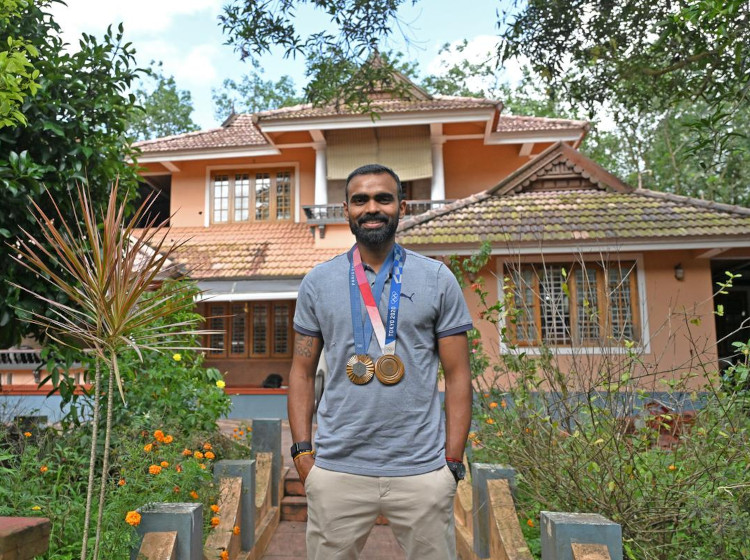
Article by Pranay Rajiv.
Photograph credit Thulasi Kakkat. Article and photograph courtesy
Sportstar
 he
November 2024 Photograph of the Month is of former India goalkeeper P. R.
Sreejesh outside his home in Kerala. The article below is excerpted from Sportstar.
he
November 2024 Photograph of the Month is of former India goalkeeper P. R.
Sreejesh outside his home in Kerala. The article below is excerpted from Sportstar.
With its narrow but well-laid-out roads winding through vast,
sun-soaked paddy fields and algae-covered ponds, Kizhakkambalam
perfectly fits the image of a typical village in Kerala.
But this town, located on the outskirts of Kochi, has something
unique about it. It's probably the only town in Kerala where hoardings
of Lionel Messi are outnumbered by those of another sporting icon: P. R.
Sreejesh, Kerala's only double Olympic medallist.
Amidst the sea of greenery, Sreejesh's red-tinted home stands out,
much like he distinguished himself in the Indian hockey team for nearly
two decades in his goalkeeper's colours.
"I distinctly remember the first time I wore a goalkeeper's kit. It
was twenty four years ago, during the 2000 Ayudha Pooja. That's when
everyone sets aside their equipment for the pooja, and that was the day
I first tried it on," recalled Sreejesh, leaning back on his verandah's
sit-out, easing into the conversation.
A hockey ball weighs just over 150 grammes, but anyone who's been hit
by one would swear it feels much heavier. Now imagine that ball coming
at you at nearly 100 kmph from different angles and heights!
Overcoming the fear of pain is therefore crucial for a hockey goalkeeper
to gain a foothold in the sport.
"It wasn't until 2004, when I joined the junior Indian team, that I
wore a proper kit. A better kit not only reduces impact and pain but
also improves rebounds. A lot of our confidence comes from the quality
of our equipment," explained Sreejesh.
A goalkeeper, across various ball sports, is an antithesis to the
discipline itself. His role is to negate the very essence of the game -
scoring a goal. But in modern Indian hockey, Sreejesh flipped this
narrative. His stellar performances in goal became the foundation upon
which Indian hockey experienced its revival.
The heartbreak of not qualifying for the 2008 Olympics was replaced
by the triumph of consecutive Olympic bronze medals, breaking a 41-year drought.
Sreejesh labelled the Tokyo bronze as his favourite of his two bronze
medals. "The taste of food for a hungry person is vastly different from
that of someone who's already eaten. That first medal was like rain on
drought-hit land. The second time around, we went expecting to win," Sreejesh explained.
A highlight of India's Paris 2024 hockey campaign was the
quarterfinal win against Great Britain. The Indian team defended with
just 10 men for nearly three-quarters of the game, after key defender
Amit Rohidas was shown a red card. India managed to drag the game to a penalty
shootout, where Sreejesh rose to the occasion once again. He saved one
British penalty and forced another wide, securing his team's victory.
His success in shootouts spanned the 2011 rule change, which replaced
penalty strokes with the current one-on-one penalty shootout format.
Sreejesh believes the new system has levelled the playing field for goalkeepers.
"From a keeper's perspective, a penalty stroke is 90% a goal and 10%
a save. The ball is just seven yards away, and the flick is usually
accurate and powerful. But the current shootout format makes it almost
50-50, and is fairer to the goalkeepers," said Sreejesh.
His wife Aneeshya, an Ayurvedic doctor, joined us with cups of tea
and a side of jokes, adding a casual, light-hearted tone to the
interview. The two met at G. V. Raja Sports School in
Thiruvananthapuram, where she was an aspiring long jumper and Sreejesh
was just learning the basics of hockey.
"I was worried about him getting hurt in the beginning, but then I
realised he had it under control. He was always so calm heading to the
field," Aneeshya recalled, as their children - 10-year-old Anusree and
7-year-old Sreeansh - darted shyly through the living room.
Sreejesh reveals that he has saved nearly 80% of his hockey earnings.
This financial caution stems from the challenges Sreejesh and his family
faced early in his career.
"My father was a farmer. We never went hungry; there was always food
at home. But there wasn't any extra money. If everything is readily
available, you don't appreciate its value. I am who I am today because
of what I've been through," says Sreejesh.
Sreejesh was employed by the Indian Overseas Bank in 2006. "That job
was a huge relief. I had a steady income, and if I ever got injured, I
would have a
fallback. Sportspeople are like show horses. If you get injured, you're
cast aside. I always tell younger athletes to get a job alongside their
sports careers, for that sense of security," adds Sreejesh.
Olympic fame has also brought an explosion of brand endorsements and
nationwide attention to the 36-year-old. But Sreejesh isn't easily
dazzled by fame. "It's not like I won a lottery or something. This fame
has not appeared overnight. I've been playing
hockey for 24 years, and have been part of the Indian team for nearly 20."
Amid all the milestones in his career, one thing remains certain -
his connection to home. "I don't think we can move from Kizhakkambalam.
There's a sense of belonging here. The people are cooperative in a way you don't find in
cities. I'm away from all the disturbances when I'm here. It's a different feeling," says Sreejesh.
As the interview wrapped up, the medals return to their place on the
coffee table, waiting for that one-in-a-hundred visitor Sreejesh hopes
will see the medals and be inspired to carry his legacy forward.
![]()